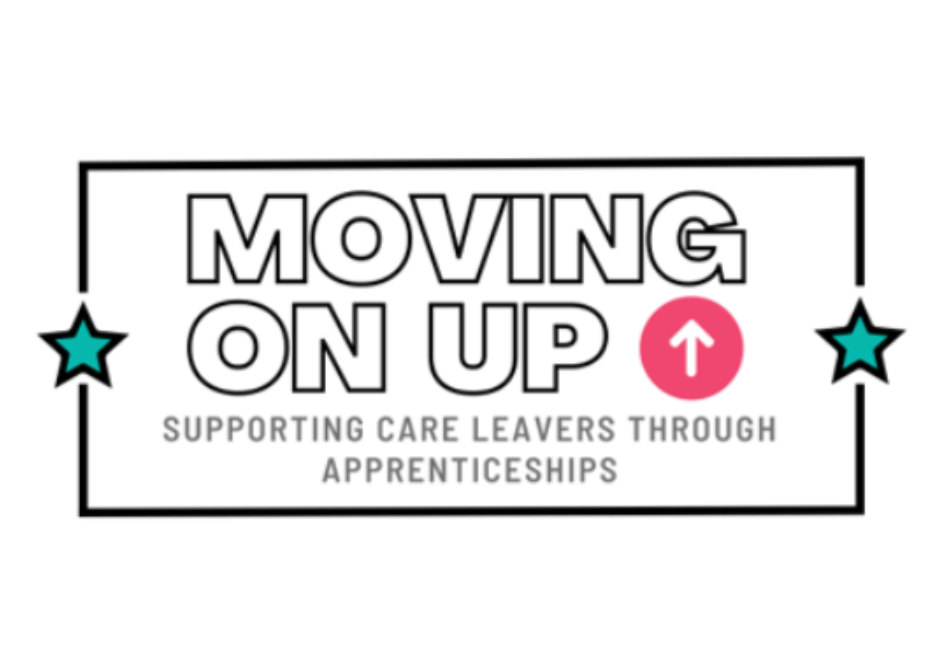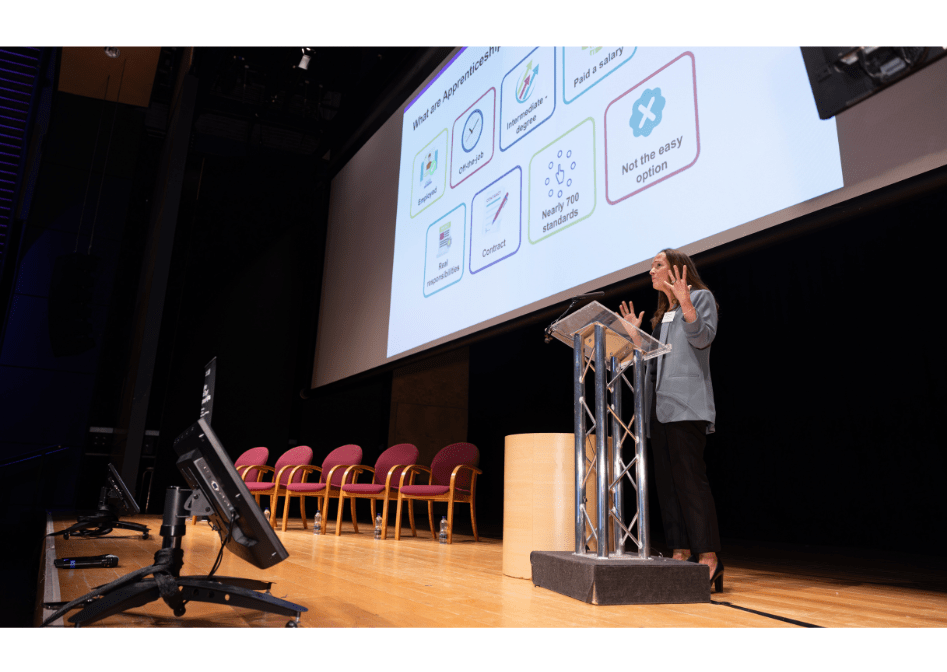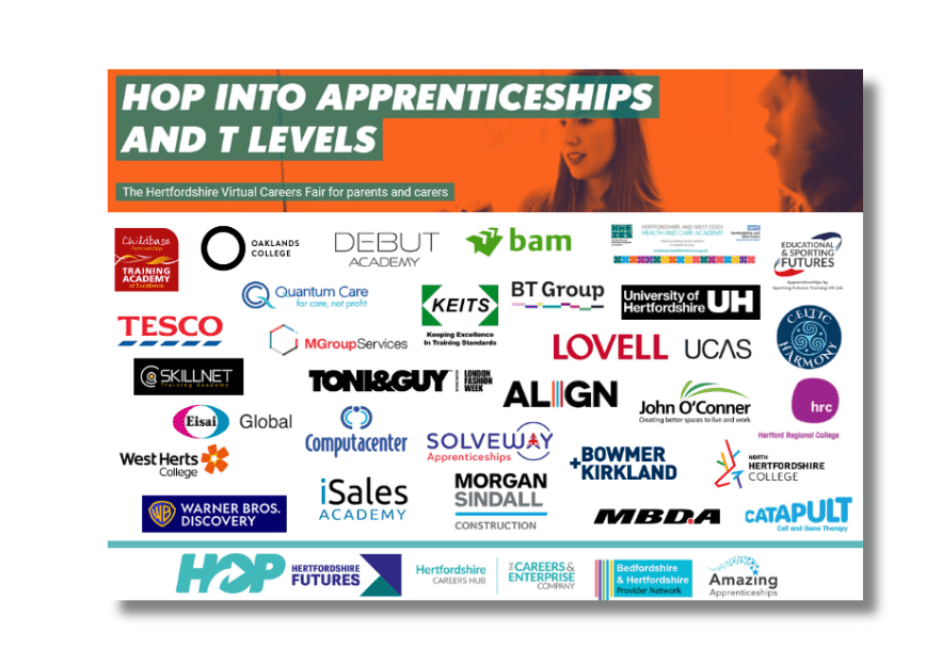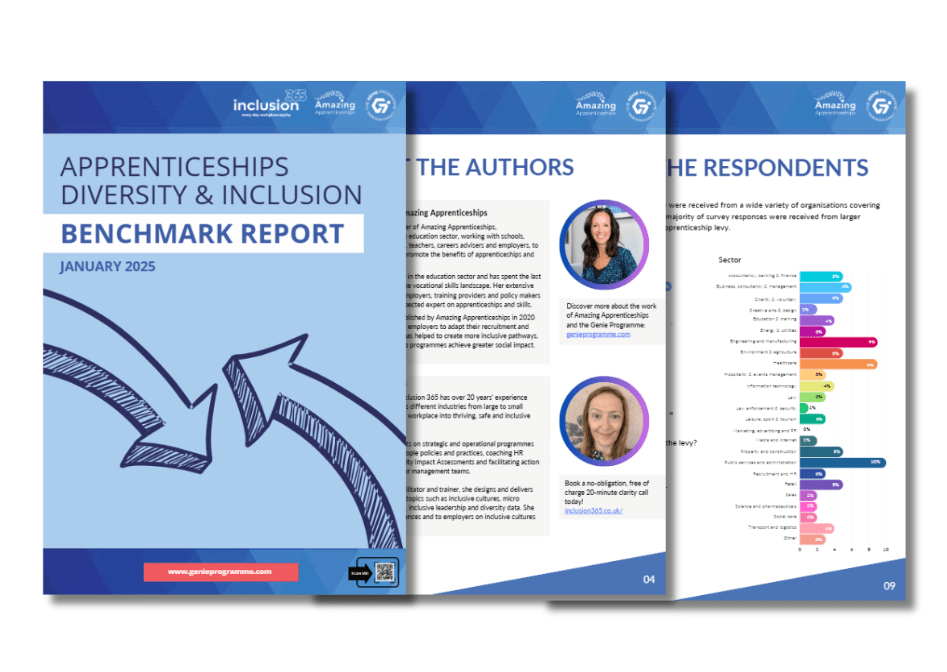Care Leaver Covenant; the Reality of Care Leavers
March 09, 2021
Last October the Care Leaver Covenant hosted an Empathy Summit, offering a greater insight into the plight of Care Leavers. This made us, as an employer ourselves and as a resource for employers, all the more mindful of some of the challenges that care leavers find in accessing their apprenticeship opportunities.
Inspired by the summit, over the past few months Amazing Apprenticeships have been working with the Covenant to become more involved. We have initiated a pilot programme in Hertfordshire which is very much a collaboration between the Local Authority, a mix of local employers, training providers and the Amazing Apprenticeships team to ringfence opportunities with employers for care leavers, we have been working with the Social Mobility Commission to ensure that employers are really thinking about their responsibilities as employers and we have launched The Genie Programme.
Anna Morrison recently spent some (digital)time with Matthew Gordon, CEO of the Care Leaver Covenant to understand more about why he and his amazing team do what they do, how employers can get involved, some of the lessons learned, explore where and how employers are demonstrating best practice, and why it is all of our responsibility to be more aware when it comes to the reality of care leavers.
Anna Morrison “Welcome Matthew and thank you for taking the time to speak with us. Can we start with a little bit of background on the Care Leaver Covenant, why it exists and how it came about?
Matthew Gordon “I always tell people that the Covenant chose us rather than us choosing the covenant.”
Back in August 2015, a young man called Ryan left our care service as he turned 18. He was the first young person to be accommodated by Spectra at the age of 3. Ordinarily at this time, you would say to your young person. “If you ever need anything, you know where to find me. I’m always there and the end of the phone call or the end of the line.”
Ryan didn’t call.
It got to Christmas and we hadn’t heard a thing. Ordinarily our statutory obligation would be suspended, but because of the rapport and relationship we had had, I felt the need to reach out to him. His mobile wouldn’t connect. So, I pushed further and I went to find him.
He was living in an absolutely devastating state.
This moved us all as an organisation. It wasn’t right that the life of a young person who had spent 15 year with us, unravelled so spectacularly in just 3 months. We had to do something. We needed to do something. We had to ensure our young people were given every opportunity to remain on an even keel after leaving care.
We began to lobby the government and in 2017 The DFE launched the tender for the Care Leaver Covenant.
We were a tiny agency. We had no business applying for something as grand and as national as this. However we were compelled to go for it. We were already doing the work voluntarily. So, we responded to the tender, won it, and that is how we were connected.
AM – Can you talk us through how employers can become involved in the Covenant and what are they signing up to
MG – The short answer is that ‘it varies’!
There are five outcomes to the ‘Keep on Caring’ policy document.
The overarching one is helping our young people to live independently.
The second is around education training and employment.
The third is safe and secure which is covered by criminal justice and housing.
Mental health and wellbeing is the fourth and then the fifth one is financial stability.
Employers, organisations, or public sector departments buy into helping our young people to enhance their lives – they can make an offer, or an opportunity, that fits under one of these five outcomes. If it’s an employer in this context, it might be an apprenticeship, it might be a job offer, additional training or an internship.
A great example which has grown exponentially over the last two years to support our young people is the Civil Service internship scheme which has grown phenomenally to now offer placements to over 300 candidates. Employers and organisations could look to mirror their lead, even on a smaller scale or perhaps with more comprehensive employment offers.
AM – It’s amazing to have an organisation like the Civil Service headlining it in that way, and showing what is possible. What other kinds of organisations are signing up to the Covenant?
MG – It varies, and we’re proud of that variation. Our strategy was to target digital construction and hospitality as all were showing significant growth.
Of the more well-known companies we have the likes of ITV, Metro Bank, Rolls Royce, Engie, Compass Group, HS2 and Amazon.
AM – If you look at the data, there are low numbers of care leavers progressing into apprenticeships compared to some of the other destinations that they might follow. Why do you think apprenticeships are not the first choice for care leavers or why they might not be finding their way successfully into those some of those opportunities?
MG – This is such an important question.
By and large, the average or general apprenticeship doesn’t work for our young care leavers simply due to fair pay and equitable pay that matches the need.
Let’s return to Ryan again as an example. At that time, he could earn perhaps £110 a week as an apprentice on minimum wage.
For your kids or mine that would go towards funding a new pair of trainers, a mobile phone and maybe a few takeaways.
But for a care leaver, that needs to fund everything. Housing, food, all living expenses.
Therefore, an apprenticeship wage is not equitable. I think there is an unspoken assumption that when you have an apprenticeship there are a number of protective factors that will insulate you from some hard costs.
By and large, a care leaver doesn’t have the same support network so it’s far more difficult to make the finances work if you are care experienced, or you have to shoulder financial burden.
It only becomes an attractive proposition if the employer is cognisant of some of those broader challenges and wants to inflate the pay arrangement.
AM – Is it just on the employer or are there other systems or services that could be stepping into support better for apprenticeships?
MG – I think housing providers/associations also have a role to play in making it work.
There is a really interesting live-in work scheme model in Birmingham, run by the charity St Basil’s whereby all workers have subsidised rents which enables them to see the benefit of the pay.
AM – That’s a really interesting link. Housing associations create a lot of employment opportunities as well with property maintenance, administration and finance and they’ve got huge employment machines behind them. Have you seen any other similar models where perhaps those who were offering the housing are creating the job opportunities within the association as well?
MG – Yes, though not enough. We’ve got an amazing relationship with Bournville Village Trust, based in the West Midlands, who are looking at how they can increase employee employment capacity within their group. They’re not necessarily apprenticeships but there was definitely an employment offering, as well as a housing offer too.
AM – Is there more that should be getting done around the Social Value Act, do you think?
MG – I think there’s always more that we, we can be doing but we have come a long way
Considering that there was no internship scheme three years ago, and now we have 300. Organisations such as ITV are involving social mobility care leavers and embracing social value which is a massive step forward and the likes of Amazon have instigated [email protected] for anybody who has an enquiry and is driven by their commitment to social value.
So, yes, there is more that can be done, but I’m celebrating the milestones that we’ve reached.
AM – It really is incredible. I think it’s creating such a momentum behind it as well because so many employers want to do more. They just perhaps don’t know where to start. Particularly SMEs and smaller employers who don’t have big corporate social responsibility teams or social value teams. What should they be doing? Should they be ring-fencing positions and saying, this is going to be for care leaver, or would it work better if they had more inclusive recruitment practices so it became more part of just how they work as an organisation rather than being something on its own?
MG – I think it’s all of the above. Quite frankly I have found that SMEs, are our strongest partners.
SME’s generally have a local connection and a shared value of reciprocity. Working with somebody local drives benevolence and action. And that’s where SMEs can make a difference. Because there is a local robust connection and local commitment to helping individuals who may be from your area. There is a natural inherent rapport.
I’ve seen strong examples in Leeds and also in Cheshire where SMEs have really grasped the nettle when it comes to playing their part.
AM – We’ve definitely seen that from the Hertfordshire programme that we’re launching. It is about local employers wanting to help local communities. Quite deliberately, we haven’t gone for some of the biggest employers in the county because we want it to be a much more personalised approach, and to also create a variety of positions across different industries, sectors and job roles. Individuals need choice, and they need variety and it wouldn’t be fair to kind of homogenise everyone into one group and say “There you go care leavers, there are your 15 vacancies”.
MG – I’m also very keen to see it work in rural communities like Somerset, Devon, Cornwall where young people are represented but you might not have some of the larger multinationals in those spaces – in those regions we rely quite heavily on SMEs stepping up and so that’s why I think initiatives like kickstart will add value. You know levelling the playing fields or being more equitable options.
AM – What is your greatest wish for this moment of change, this post-pandemic recovery where it feels like employers are looking at things differently, recognising their social responsibility?
MG – There are so many. I’d like to draw inspiration from the Empathy Summit and something that Sir Peter Basil, chairman of ITV said,
“We have 25% of individuals who are in prison who are care experienced and 7% who are in Higher Education. Wouldn’t it be great if we could reverse that!”
I think if we are going to reverse that trend apprenticeships, psychologically informed environments are going to need to play a role. You have young people who with complex vulnerabilities who live within the criminal justice system who need to find hope in wider society, facilitating opportunities and being champions for them.
Empathy is going to drive all of that, empathy, facilitation and consistency. We are looking at real culture change which needs to last if we’re going to see significant sustainable change.
AM – I’m keen to break down some of those misconceptions around care leavers or care experienced individuals as a group, and help more employers to understand and realise those brilliant skills and attributes that some of those individuals could bring to them. What do you think will help this?
MG – An employer needs to understand that they might not gain a complete academic history with a care leaver, or there may be times when they might react differently to a situation within the workplace. If we can be more mindful, open and embracing, employers will see that by diversifying their workforce they will be adding to their culture. It shouldn’t be about necessarily finding someone to fit in, rather someone to challenge, to rock the boat. You will never diversify if you just keep recruiting to type.
AM – Finally, what is your favourite part of the covenant?
MG – Connecting with our young people. There are all of the stories on the website. stories of resilience and perseverance and overcoming adversity. It gives you inspiration and motivation to do more. And to keep pushing.
Connecting with our young people is what authenticates our whole process and engagement, and knowing that you’re going to make a positive difference.
Life Of Ryan from Amazing Apprenticeships on Vimeo.
If you would like to find out more about the Care Leaver Covenant, please visit https://mycovenant.org.uk/
For more information on The Genie Programme, check our latest news.
Latest News

March 13, 2025
Moving On Up Network receives special message from Jacqui Smith, Skills Minister

February 24, 2025
Cutting Through The Complexities Of Apprenticeships

February 17, 2025
Amazing Apprenticeships’ special mention in Parliament

February 17, 2025
Exploring Opportunities in Hertfordshire

February 17, 2025
2,400 vacancies from over 80 leading employers – The January listing is here!

February 03, 2025





